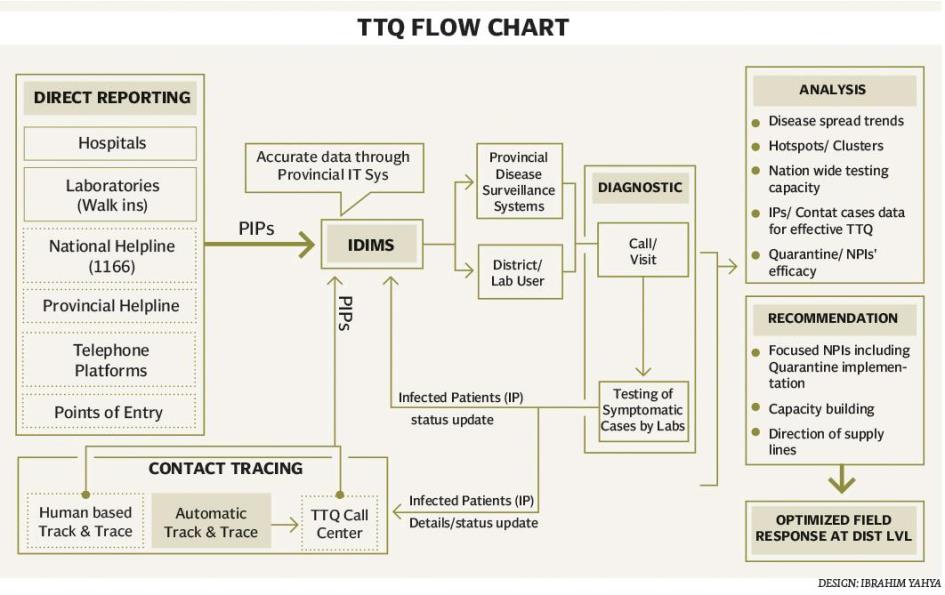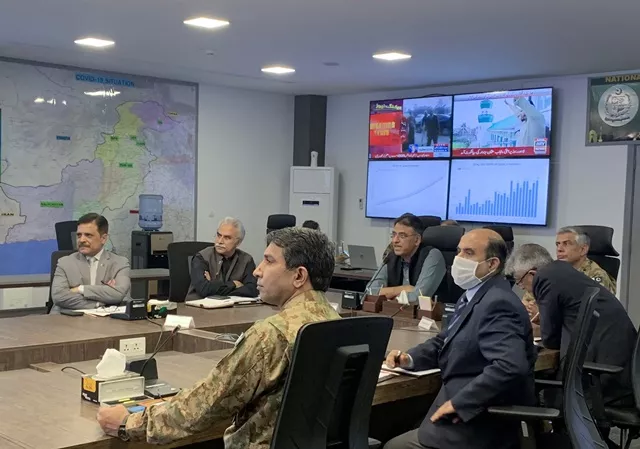A look inside Pakistan’s Covid-19 response
From being developed ‘on the fly’, NCOC has come to signify the highest degree of multi-sectoral coordination
KARACHI: Developed or developing, the novel coronavirus pandemic has caught all nations off guard. But even as some countries with what were assumed to be robust crisis response mechanisms struggle to contain the virus, Pakistan encountered the double challenge of building such a centralised structure while keeping Covid-19 at bay.In that respect at least, the development of the National Command and Operation Centre (NCOC) has been a remarkable achievement for the country and one reason why the coronavirus outbreak here has not been as severe as some other nations around the world.
Speaking to The Express Tribune, Prime Minister's Focal Person on COVID-19 Dr Faisal Sultan stressed that it was important to note that the NCOC and the wider Covid-19 response structure around it was ‘created on the fly’.

“The structures we had before NCOC did not connect the centre and provinces in any meaningful way. There was no central database and no clear channels of communication,” he emphasised. “As such, it was not effective for any kind of pandemic response.”
Bridging the coordination gap
Dr Sultan explained the NCOC was developed to bridge the coordination gap between the centre and provinces. “This is how it fits in. It brings together all relevant federal and provincial ministers, with the health minister as the central figure. I am there as well as the focal person on Covid-19. Then we have the military giving us a helping hand wherever possible. Particularly in logistics and coordination, our military carries those responsibilities out with excellence.”
“We meet every morning and have a session with all provinces on line. Areas of common concern are discussed first to that everyone present is on the same page,” he said. “Everyday, we examine the daily epidemic curve and all associated trends. The health department gives us a presentation of the epidemiology of Covid-19.”
“Twice a week, we also discuss data trends in more detail in order to get some sense of Covid-19 forecasting. That is how we figure out whether we have enough resources for the immediate future or whether we have to make any other arrangements,” he added.
“One thing I would like to emphasise is that you cannot have a greater degree of multi-sectoral coordination between the provinces and the centre than what the NCOC has provided,” Dr Sultan pointed out. “There may be differences of opinion, particularly on methodology, but everyone is on one page when it comes to the objectives.”
The ‘Test, Track and Quarantine’ strategy
A major initiative launched by NCOC last week and what will perhaps define the next phase of the country’s Covid-19 response in the days to come is the national Test, Track and Quarantine (TTQ) strategy.
The strategy envisions ramping up testing to identify Covid-19 hotspots as a precursor to easing blanket lockdowns and moving towards a ‘smart’ containment model.
“You cannot just close everything for a year or even six months,” Dr Sultan said, while discussing the TTQ strategy. “If we have to save ourselves from this crisis, we need to move towards a differentiated approach.”
Detailing how the TTQ flowchart would work, officials said it begins with direct reports of Covid-19 cases from hospitals, laboratory walk-ins, national and provincial helplines, etc. From there, data is fed into the IDIMS, which will allow authorities to both trace those new Covid-19 patients have been in contact with and figure out where the virus hotspots are and what infection trends look like.

According to the officials, a TTQ apex committee comprising the focal person on Covid-19, the federal and provincial health ministers and each province’s health secretary will oversee the strategy. A TTQ execution cell, comprising four subordinate groups will report directly to the apex committee while providing support, assistance and guidance to existing provincial mechanisms, like PDMAs.
The way forward
Dr Sultan said authorities have already started tracing people who had come in contact with Covid-19 patients. “A week ago, we started preparing lists of those who been close to Covid-positive people. We have now handed these lists to the provinces for secondary testing,” he told The Express Tribune.
Dr Sultan also revealed that the government will launch automated telephone surveys in the coming days to detect Covid-19 hotspots while mitigating resource constraints.
“We will start with a pilot project in either Islamabad or Khyber-Pakhtunkhwa. The idea is you will get a phone call with an automated message asking to press a number according to any symptoms you have. Based on your response, a physician could then call and interview you and decide if a test is needed,” he explained.
Asked about whether the authorities expected people to respond truthfully to the telephone surveys, Dr Sultan admitted it was a big challenge. “You see, crisis tends make authorities react forcefully. That in turn, makes people reluctant to cooperate,” he said. “But we are trying to destigmatise Covid-19 so that people are more forthcoming.”


COMMENTS
Comments are moderated and generally will be posted if they are on-topic and not abusive.
For more information, please see our Comments FAQ